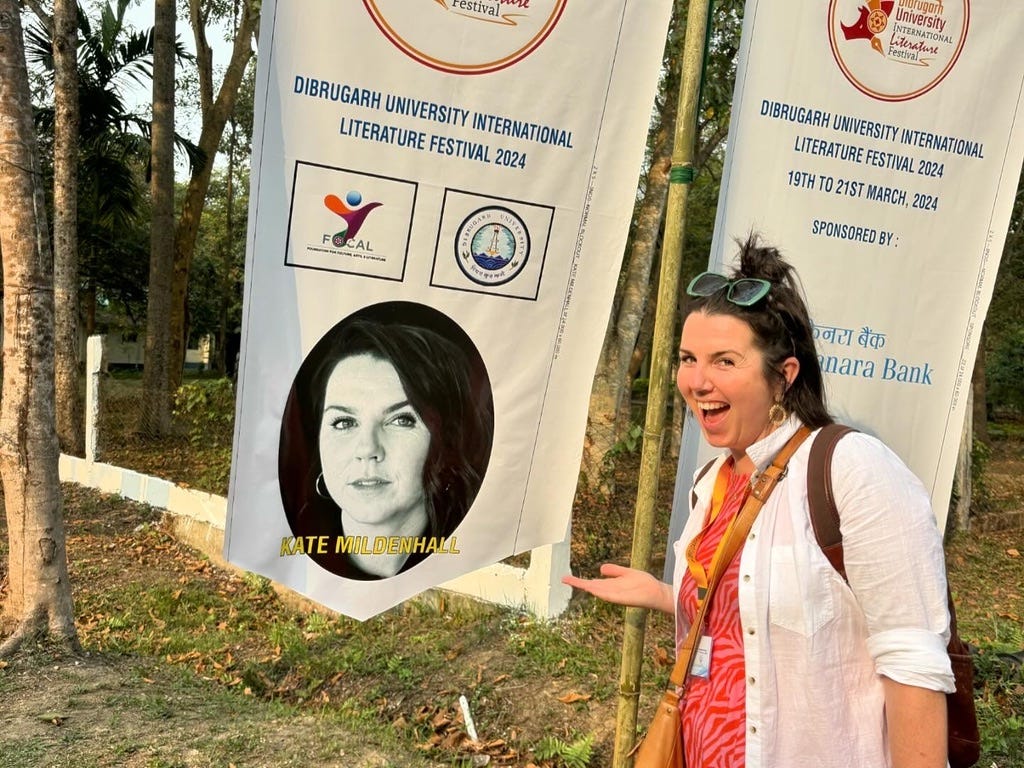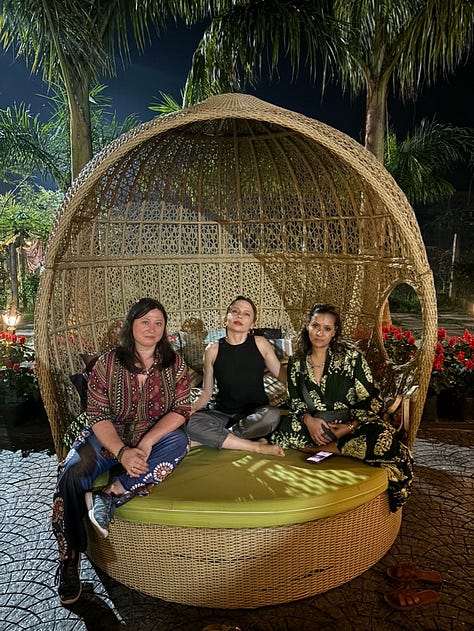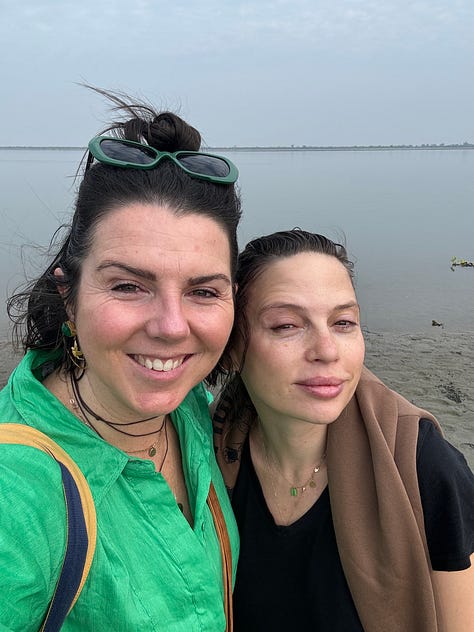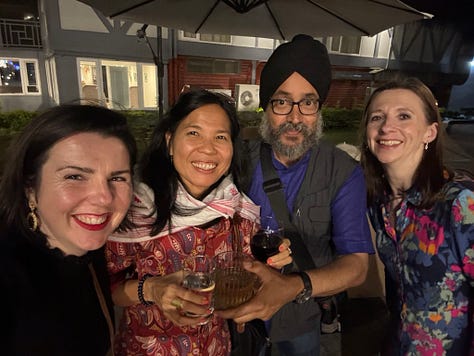When I wrote down the adventures - in work and life - I wanted to manifest for 2024, an invitation to an international lit fest in North East India was not on the list. Not because I wouldn’t want such a thing, but because it was outside my imagining.

We talk a lot about imposter syndrome in the writing world and I felt it in spades as a guest at the Dibrugargh University International Literature Festival. I received the invite through one of those serendipitous meetings I so adore, when local author Neil Grant came to a workshop I ran and then messaged the next day asking if he could put my name forward for this festival as he wasn’t able to go. It was a short timeline to get everything arranged and there were many times when I wondered if my saying yes to this thing was a little mad. Not least because I was the only Australian guest and there were SO many other writers who I felt could and should have been invited in my place. (I’ve sent a LONG list of writers as suggestions to festival organisers for the next iteration of DUILF!) But in keeping with my deep belief in serendipity and how it works, off I went.
The festival is organised by the Foundation for Culture, Arts and Literature (FOCAL) and curated by the irrepressible Rahul Jain and his team. The setting was Dibrugargh University in Assam - a region best know to the outside world for its tea, and the extraordinary braided Brahmputra river which flows through Tibet, North East India and Bangladesh. There were 85 speakers from more than 17 countries in attendance with university and college students and staff making up the huge audiences.
On political expression
As in many festivals right now (and discussed in this KYD article), guests were asked to refrain from expressing political comments. As discussed over dinners among the writers, it is impossible to refrain from expressing political comments at a literary festival; writing is political. In his opening address, Damodar Mauzo spoke of the key issues for him right now: imprisoned writers, the rights of women, the climate crisis, Gaza and Ukraine.
Writers are supposed to be the legislators of humanity.
Damodar Mauzo
For many of the writers, expressing their views is dangerous. Vietnamese critic, Quyen Nguyen, spoke of the difficulties of ambiguous censorship in Vietnamese publishing. How writers don’t know which parts of their work will be deemed inappropriate by government censors, how it’s always a gamble, and the irony of the translation of Orwell’s Nineteen Eighty-Four making it through the censors unchanged. Ukranian writer Irena Karpa and poet Halyna Kruk spoke of the many artists who are currently on the frontline in Ukraine, about those who have been killed, about the necessary but exhausting work of constantly advocating for the world to not look away from what’s happening in Ukraine (find a list of places to help at the end of this post). Writer and gender rights advocate, Santa Khurai, shared the story of Malem Thongnom and her current hunger strike for peace in Manipur.
I spent a lot of time listening. As it should be for a white, privileged woman from the West. I was asked about the role of the Governor General in Australia and our refusal to move away from the monarchy. I was asked about racism in Australian cricket. I spoke about our failed referendum to get constitutional recognition for Aboriginal and Torres Strait Islander Peoples. When asked about the Australian literary landscape and current issues, I spoke about lack of diversity (although acknowledged this is changing slowly), and reiterated that the best guest from Australia for this festival next time will be a First Nations writer (shout outs to Tara June Winch, Ali Cobby Eckerman, Evelyn Araluen and Anita Heiss whose work was among that which I recommended).
What I took from so many of these conversations was a gut-punch reminder of my own privilege (and that of many, but not all, of us in Australia) - to write what I want, to express political opinion without fear of reprisal and to have the opportunity for those words to be published.
On language
My other great imposter feeling came from my woeful lack of other languages. The festival was conducted in English, sometimes in Hindi or in Assamese for certain phrases or ideas. Most writers attending, and the students, spoke at minimum two or three languages and some spoke many more. I finished reading Christos Tsiolkas’s The In-Between on the plane ride home (in prep for our upcoming conversation with Charlotte Wood and Emily Perkins at NWF) and laughed out loud at this:
It is the most infuriating deficiency of the English-speaking nations, their laziness with languages.
Christos Tsiolkas, The In-Between
I left determined that learning another language beyond school girl French is now on my bucket list. But, this is pure self-centred whining and the discussions of language were some of the most enthralling I listened to; on ‘foster’ English as a means of communication between speakers of many languages, on the non-gendered aspect of some languages spoken at the festival, on the challenges and delights of translation. Watching Ukranian writer and journalist Irena Karpa and Bangladeshi writer and social worker Srabonti Ali do an incredible interactive workshop on therapeutic writing with their Indian audience who then read their responses in English was mind-blowing. I have scrawled words like ‘indexicality!’ (from feminist scholar and academic Rita Khotari - my new lit crush) and ‘music has no gender!’ from the great Tamil writer C.S Lakshmi (Ambai)) but as always, I wish I had taken better notes.
One language we shared on stage was that of rivers, when I joined historian Arupjyoti Saikia, Assistant Conservator of Forest in Dibrugargh Forest Division, Amol Borhade and expert in environmental issues and Principal Secretary to the Government of Assam, B Kalyan Chakravarthy for a full-house panel to discuss the climate crisis. What does a novelist know, right? But it felt good (if bracing) to be the outsider on this panel, and to hear the frustration with Western nations failing to do their bit to hit targets. I spoke a little about writing the river perspective in The Hummingbird Effect and there was a great question and follow up conversation with Arupjyoti Saikia about whether he ever ‘thinks as the river’ in his research on the Bhramputra. Of course he does, and he made the point we need to consider non-human voices and perspectives much more if we are to find solutions to our current crisis.
Reading beyond the mostly British and US books on her shelf has been a big project for Ann Morgan, who shared a wonderful conversation with me on stage for a bunch of enthusiastic students (and wrote about the festival here). Ann’s quest to expand her reading saw her read a book from every country in the world (you can find her extensive list plus other suggestions by country here ), often by way of long and complex chains of suggestion, connection, assistance and group translation.
On connection
Late night conversations about parenting. Dancing in the grass at a splendid estate. Big hugs. Bigger laughs. The instant fast friendships formed when you are far from home and out of your depth and quietly exhausted and totally overwhelmed. Laying fruit offerings with Irena on the sandy bank of the Bhramputra with the cows. Chai with a family in their grandmother’s home and laughing and fumbling together over words for platypus, pumpkin, jackfruit. Attempting to stay in our seats as the incredible Assamese band played at the Closing Ceremony.
Ankita, the generous student volunteer (and PhD candidate researching food sovereignty) who looked after me during the festival in every possible way. Talking Cambodian memories with Khmer writer and publisher at Avatar Publishing, Socheata Huot amid the fairylights and rows of marigolds. Posing for hundreds and hundreds of selfies with students and having snatched conversations about studies and dreams. A wild ride to the market. The exchange of books and emails. One last drink to keep the conversation going.
The joy of turning up to a festival where you know nobody is the wild openness you have to embrace. I am still heady with it all and so incredibly grateful to all the fabulous people I met - most especially my festival crew (by way, first, of hotel location and then much fun and gentle mocking of my ‘White Lady First Time in India’ vibe) - you are the best xx






The motto of the DUILF is Where Worlds Weave Words and Rahul Jain was the great weaver who, with his team from FOCAL, brought all these people and words and stories together. Rahul is a joy - entrepreneur, lover of words and cricket and wine, superb host and one of those people who not only has the wild idea but then somehow manages to pull it off. Forever grateful to have come into his orbit.
Like I said at the outset - feels impossible to try and sum up this experience and I’ve left so many people and so many moments out, but it’s a start. Here’s to something outside your imagining becoming a reality. K x
Books I came home with
Anything But Human by Singaporean poet, editor & critic Daryl Lim Wei Jie (who is appearing at Sydney Writers Festival in Eat Your Words)
Boy, Unloved by Goan writer Damodar Mauzo
Broken Voices by writer and social worker Srabonti Narmeen Ali from Bangladesh
Crossing Over by UK writer and speaker Ann Morgan
Hope in Technicolour, also by Srabonti Narmeen Ali from Bangladesh
Monsoon: a poem of love and longing by poet and translator Abhay K from India
Reading the World: How I Read a Book from Every Country by UK author Ann Morgan (also check out Ann’s blog of this project)
The Surgeon and the Clouds by Assamese poet Nilima Thakuria Haque
Unbordered Memories: Sindhi Stories of Partition - edited and translated by Rita Kothari
Upon a Sleepless Isle by Sri Lankan writer Andrew Fidel Fernando
And will be searching out English translations of A Crash Course in Molotov Cocktails by Halyna Kruk & How to Get Married However Many Times You Want by Irena Karpa.
Things to follow up
Irena was generous enough to share some of the organisations she has a connection to who are doing important work in Ukraine right now that you might consider supporting by donation.
Ukranian Women’s Veterans Movement. Find an English translation about what this movement does via the instagram link below and/or donate here.
UAnimals: Evacuating animals from frontline areas. Go here and Hospitalis who you can donate to via paypal, details here.
Writer Lorna Nizyna who works to support frontline. Go here
Huge thanks and congratulations to Karen Ginnane and Zewlan Moore who lead the extraordinary OzKidLit For Kids Fundraiser to Aid Children in Palestine, which raised nearly $38000! If you missed out on being part you can still donate here
Many of the writers I met at Dibrugargh had links to PEN International, an organisation who do vital work to defend freedom of expression and promote literature worldwide, particularly at a time when the lives of writers are at risk in conflicts and under oppressive conditions around the globe. You can become a friend of PEN or check out local branches such as PEN Melbourne.
Coming Up
I’ll be heading to Newcastle Writers Festival April 5-7 which has a HUGE program that I’m super excited about. I’ll be festival-fairying my way about trying to get to as many events as possible and will be appearing at:
The Responsibilities of Women with Emily Perkins, Kylie Needham and Anna Downes. Sat April 6, 1.30-2.30pm.
Shitty First Drafts: On Creative Practice, hosting Charlotte Wood, Christos Tsiolkas and Emily Perkins. Sun April 7, 10-11am. (Also available to livestream).
Blurring Genre, Blurring Worlds with Sharlene Allsop, Shelley Parker-Chan and Chris Flynn. Sun April 7, 3-4pm.
After that I’ll be at Sorrento Writers Festival and Sydney Writers Festival - festival season in full swing!





So good. Welcome home xxx
Kate I really enjoyed reading about your trip to India and the incredible literary festival you were a part of. You have inspired me to read outside of my comfort zone and books from around the world. Inspiring and powerful, thank you for sharing 🙏